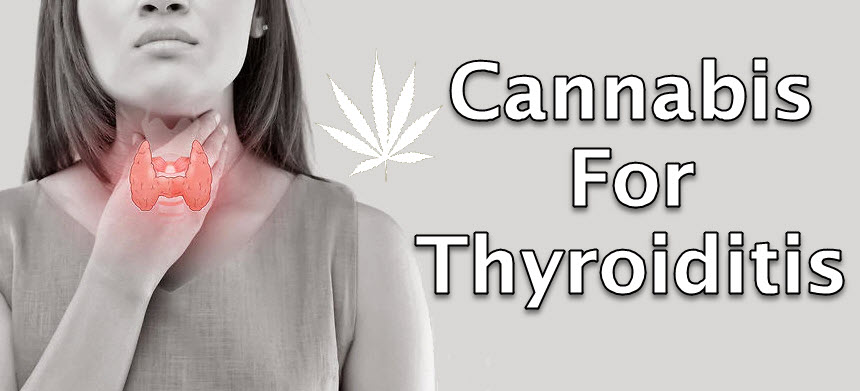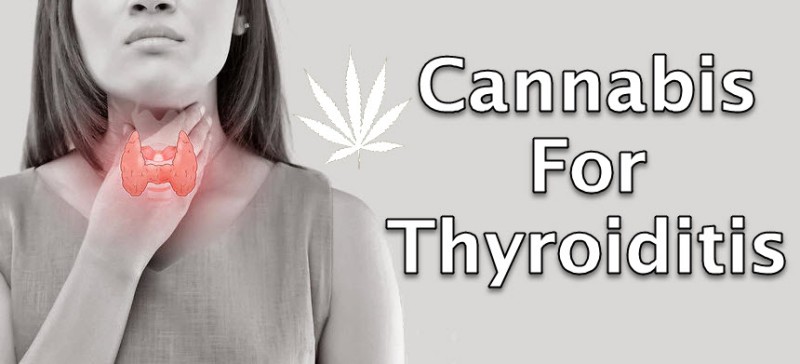Cannabis For Thyroiditis

Thyroiditis is an umbrella term for several kinds of thyroid disorders, although they all have inflammation in common. The thyroid is a gland found in the center of the neck, and it’s responsible for producing many important hormones.
The hormones secreted by the thyroid help regulate your metabolism, which is also critical in determining how quickly your body will break down food or produce heat. The thyroid also helps ensure your heart has a steady beat. Most thyroiditis conditions manifest symptoms that are categorized into either hypothyroidism or hyperthyroidism. If thyroiditis results in chronic, slow damage to thyroid cells, resulting in a drop in thyroid hormone levels in your blood, you will experience hypothyroidism. This is also known as an underactive thyroid. Symptoms include weight gain, fatigue, depression, dry skin, and a low tolerance to exercise; such as what is seen in individuals who have Hashimoto’s thyroiditis.
On the other hand, if thyroiditis causes fast-acting cell damage, thyroid hormones stored in the gland ends up leaking out, resulting in increased hormones in your blood. You will then experience thyrotoxicosis; whose symptoms are like that of hyperthyroidism. These include insomnia, anxiety, palpitations, fatigue, irritability, and weight loss. The symptoms of both hyperthyroidism and thyrotoxicosis are brought about by increased levels of the thyroid hormone in the bloodstream but in the case of thyrotoxicosis, the gland isn’t completely overactive yet.
An inflammation of the thyroid is usually caused by antibodies, such as those present in autoimmune diseases including rheumatoid arthritis and type 1 diabetes. Infections, such as bacteria and viruses, can also cause thyroiditis. The most common types of thyroiditis are Hashimoto’s, post-partum and painless thyroiditis, sub-acute thyroiditis, drug-induced thyroiditis, and acute/infectious thyroiditis.
Around 20 million Americans are living with some kind of thyroid disease. An estimated 60% of that population don’t even know that they have it. Treatment for these conditions will depend on the kind of thyroiditis you have, as well as the symptoms that are present. Thyroid hormone replacements are usually recommended, as a means of restoring your normal hormone function and stabilize your metabolism. However, treatments are not always effective for many patients.
How Cannabis Can Help
Although few and far in between, there have been studies that show promising results for cannabis in treating the symptoms of thyroid disorders. While it may not be a cure in itself, cannabis used alone or in conjunction with conventional thyroid treatments can greatly improve a patient’s quality of life.
In 2002, a study in the European Journal of Endocrinology assessed the impact of cannabinoids on the thyroids of mice. The rats that were given cannabinoids saw a 30% reduction in hormone production, which has led the researchers to conclude that cannabinoids may be beneficial for treating the symptoms of hyperthyroidism by slowing down the release of thyroid hormones in the blood.
Another study, this time in 2009, published in Endocrinology, examined the effect of CBD in activating the hormone-synthesizing axons located between the central nervous system and the thyroid gland. Though it led researchers to believe that CBD is promising in helping patients with different thyroid needs by reducing thyroid overactivity while encouraging hormone release in those with underactive thyroids, researchers called for more clinical trials done on the subject. “The presence of both symmetric and asymmetric type CB1 synapses on thyrotropin-releasing hormone-synthesizing neurons in the hypothalamic periventricular nucleus suggests that endocannabinoids may influence both excitatory and inhibitory inputs of these neurons,” write the researchers.
In 2015, a study discovered that cannabinoid receptors have the potential of functioning as therapeutic targets for benign and malignant thyroid lesions.
It comes as no surprise that thyroid disorders respond to cannabis-based treatments, since scientists discovered the presence of cannabinoid receptors on cells within the thyroid gland. Cannabinoid receptors have also been found in the hypothalamic paraventricular nucleus (PVN), a part of the brain that is responsible for regulating thyroid activity by sending signals to the gland.
Cannabis’ anti-inflammatory properties are also well-known, so taking cannabis or CBD-rich cannabis products can help treat the inflammation that causes so many of the problematic symptoms associated with thyroiditis. If you are already taking thyroiditis medications, be sure to talk to your doctor about integrating cannabis into your routine.
OTHER STORIES YOU MAY ENJOY...
MEDICAL MARIJUANA STRAINS FOR THYROIDITIS, CLICK HERE.
OR..
CAN CANANBIS REGULATE THE THYROID GLAND, READ THIS
OR...
CANNABIS FOR ENDOCRINE DISORDERS, CLICK HERE.
OR...
JUICING CANNABIS FOR SUPER HEALTH, READ HERE, CLICK HERE.










